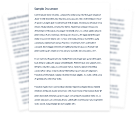Bare Trust Deed
A Bare Trust Deed establishes a bare trust. In this type of trust, the only interest that the trustee has in the trust property is the bare legal title, and it is not required to perform further legal duties.
4.1 (18 reviews)
Last updated January 14, 2025
Under 5 minutes
Suitable for Australia
Written by Edwin Montoya Zorrilla
Reviewed by Damin Murdock
Document Overview
This precedent is a basic bare trust deed to be entered into by a trustee and a beneficiary. A bare trust is a type of trust in which the beneficiary has an absolute right to both income and capital and may call for both to be remitted into his or her own name. Any income received must be distributed within the tax period it is earned. The trustee of a bare trust has no active duties to perform.
Considerations on stamp duty
As to stamp duty — generally see the introductory notes to precedent “Nominee trust deed in respect of shares” in respect of nominee trusts in respect of shares and precedent “Nominee trust deed in respect of land” in respect of nominee trusts in respect of land.
As to bare trusts and NSW landholder duty — see Landholder Duty: Bare Trusts Revenue Ruling No. DUT 41.
As to bare trusts and taxation there is currently much uncertainty — see for example Oswal v Commissioner of Taxation [2013] FCA 745 which involved the extent to which a beneficiary can be “absolutely entitled” to a CGT asset set aside on a separate trust for its sole benefit, where the trustee had a statutory right of sale and a right to be indemnified out of trust assets in respect of any liabilities properly incurred as trustee (which most trustees have). The court held that due to either of these factors, no beneficiary could be “absolutely entitled”. But on 14 February 2018 the Board of Taxation released a report into its review of the tax arrangements applying to bare trusts and similar arrangements. The key recommendation set out in the report is for the Parliament to legislate to “look through” or essentially ignore certain bare trusts and similar arrangements for income tax purposes which, if implemented, would bring much needed clarity to this area of the law.
The Legal Risk Score of a Bare Trust Deed Template
Our legal team have marked this document as medium risk considering:
- Trust deeds must follow specific signing and witness procedures.
- Deeds often involve the distribution of assets of meaningful value and carry tax implications.
- This document is relatively simple to complete.

Bare Trust Deed Checklist
Complete your free Bare Trust Deed with our checklist
Validly sign the document
Identify the right individuals or representatives and sign the document as a deed.
Get the deed stamped
Depending on your state, you might be required to have all copies of the deed stamped in order for it to be valid.
Transfer trust property
This should correspond with the property laid out in the deed.
Keep the document readily available
All parties should have the document handy as an easy reference for their obligations.
What does the Bare Trust Deed cover?
- The rights and obligations of the trustee;
- The rights and obligations of the beneficiary; and
- The procedure for changing the trustee.
Further information
View Sample Bare Trust Deed
It's never been so easy
Sign-up to a free Lawpath account
Get started and we'll take care of you. It's that easy.
Browse our 500+ legal documents
Browse our 500+ legal documents to find the perfect match to cover your business needs. We've got Compliance, Employment, Service agreements and more.
Collaborate with e-Sign and Sharing
Having access to your legal documents has never been easier. You can request e-signature, share the document and download for an efficient collaboration.
Create unlimited legal documents and eSignatures for only $39/month.
Upgrade to a Lawpath legal plan to boost your new business.


Here's what people say about Lawpath's Bare Trust Deed
Reviews are managed by BazaarVoice and comply with the BazaarVoice Authenticity Policy. Reviews are independently verified by BazaarVoice and detail our customers' real experiences.
0 reviews
Most Recent
Highest to Lowest Rating
Lowest to Highest Rating

